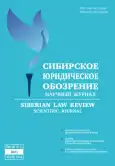Exhaustion of Exclusive Rights to Computer Programs Under the Laws of Russia, the USA, the EU, China and India
- Authors: Golovin K.S.1
-
Affiliations:
- Institute of Legislation and Comparative Law under the Government of the Russian Federation
- Issue: Vol 20, No 2 (2023)
- Pages: 174-188
- Section: PRIVATE LEGAL (CIVILITY) SCIENCES
- Published: 07.07.2023
- URL: https://journal-vniispk.ru/2658-7602/article/view/349083
- DOI: https://doi.org/10.19073/2658-7602-2023-20-2-174-188
- EDN: https://elibrary.ru/VESNWR
- ID: 349083
Cite item
Full Text
Abstract
This article provides a comparative analysis of the doctrine of exhaustion of exclusive rights in respect of computer programs with a focus on the legislation of Russia, the United States, the European Union, China and India. The purpose of this study is to examine the impact of the doctrine of exhaustion of exclusive rights on intellectual property and propose potential solutions to address problems that may arise. The laws in force in Russia concerning the exhaustion of rights to computer programs are discussed, and it is noted that they are restraining in nature and limit the distribution of computer programs to the first distribution under contracts for the complete alienation of the tangible medium. Although these laws are aimed at protecting the rights of authors and right holders, they also impede the free distribution of computer programs, making it difficult for consumers to access them. Therefore, the article proposes changes in the Russian legislation to ensure free distribution of computer programs, including the possibility of leasing, secondary sale of electronic copies and exchange. It is also proposed to reduce the requirement to recognize the introduction into civil circulation, because the existing wording “sufficient to meet reasonable public needs, based on the nature of the work” is vague and contrary to current international practice. I believe that these changes will help mitigate or circumvent current or future Western sanctions. The analysis underlines the need to improve Russian legislation with respect to the doctrine of exhaustion of exclusive rights. By adopting more flexible laws, Russia can facilitate the free distribution of computer programs while protecting the rights of authors and rightsholders. Such improvements will increase access to software and foster innovation and creativity in the digital age.
About the authors
Kirill S. Golovin
Institute of Legislation and Comparative Law under the Government of the Russian Federation
Author for correspondence.
Email: golovinks@gmail.com
ORCID iD: 0009-0002-8844-488X
SPIN-code: 5748-1248
Postgraduate Student at the Department of Private Law Disciplines Federation
Russian Federation, 34 B. Cheremushkinskaya st., Moscow, 117218References
- Kalyatin V. O. Problems of Weakening Property Rights in Digital Sphere. Civil Law Review. 2018;18(6):30- 40. (In Russ.).
- Perzanowski A. K., Schultz J. The End of Ownership: Personal Property in the Digital Economy. Cambridge: The MIT Press; 2016. 264 p. https://doi.org/10.7551/mitpress/10524.001.0001
- Savel’ev A. I. Some Questions of Application of Norms on the Exhaustion of Rights in Relation to Computer Programs. Civil Law Review. 2011;11(3):102-128. (In Russ.).
- Ghosh S. The Implementation of Exhaustion Policies: Lessons from National Experiences. Trade Policy. 2015;3:26-52. (In Russ.).
- Wang Qian. Copyright Law. Beijing: Peking University Press, 2007. 303 p. [In Chinese].
- Zheng Cheng Si. Copyright Law. Beijing: Renmin University of China Press, 2009. 792 p. [In Chinese].
- Ghosh S. A Roadmap to TRIPS: Copyright and Film in Colonial and Independent India. Queen Mary Journal of Intellectual Property. 2011;1(2):146-162. https://doi.org/10.4337/qmjip.2011.02.03
- Basheer S., Khettry D., Nandy S., Mitra S. Exhausting Copyrights and Promoting Access to Education: An Empirical Take. Journal of Intellectual Property Rights. 2012;17:335-347.
Supplementary files












